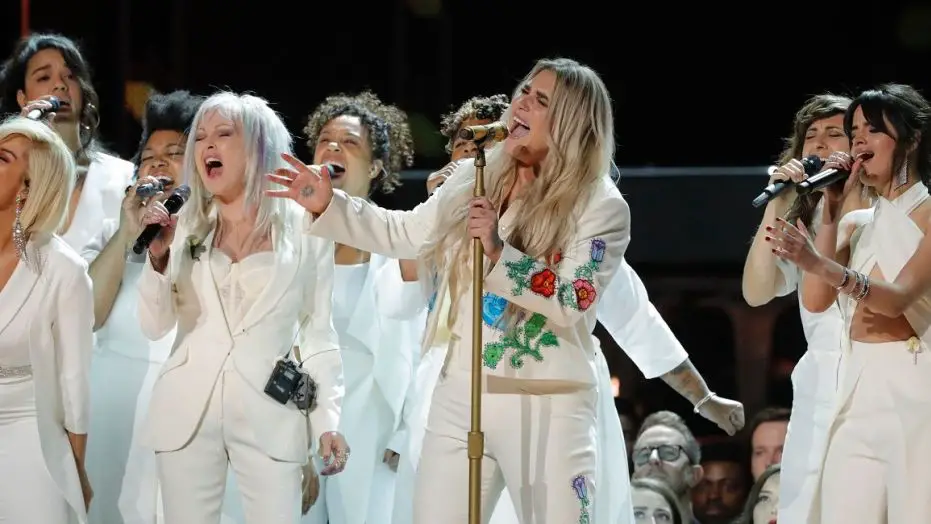After the impact of the #TimesUp movement at this year’s Golden Globes ceremony, it seemed as if the Grammys might be following the Golden Globes’ example, with artists using the awards ceremony to show their support for women. Celebrities arrived at the Grammys with white roses on their designer gowns and suits in solidarity for women, continuing the fight to end sexual assault and harassment.
Kesha, accompanied by other female artists, gave a powerful performance of her new single, “Praying” — her first release in four years after ending the long legal battle with her producer and accused sexual assailant, Dr. Luke. However, the show’s promise quickly dissipated when audiences began to notice a trend: the winners of each prominent category were all men. In response, Twitter users were fast to create a new hashtag: #GrammysSoMale.
At the end of Sunday night’s show, the only solo female that took home a major award was Alessia Cara for Best New Artist. Musicians such as Sza, Lorde and Lady Gaga all lost to men. Finally, although Kesha’s “Praying” — the song which tackled the difficult and personal topic of her struggle with sexual assault — was nominated for Best Pop Solo Performance, but ultimately lost.
The winner was Ed Sheeran’s “Shape of You,” a song about a man admiring a woman’s body. Although the night as a whole was a disappointment for women’s rights, Sheeran’s victory perfectly displayed the sad truth that is the inequality between the sexes.
The situation didn’t get any better after the show. As #GrammysSoMale went viral, journalists questioned Recording Academy President Neil Portnow on his opinion of the lack of female winners. “I think it has to begin with women who have the creativity in their hearts and their souls — who want to be musicians, who want to be engineers, who want to be producers, who want to be part of the industry on an executive level — to step up, because I think they would be welcome,” Portnow said.
As if those female artists hadn’t been snubbed throughout the night, Portnow just furthered the insult by insinuating that they just didn’t want the award bad enough and encouraged them to “step up.” Unsurprisingly, his statement received immediate backlash from the public and celebrities alike, and Portnow soon apologized.
“Regrettably, I used two words, ‘step up,’ that, when taken out of context, do not convey my beliefs and the point I was trying to make. Our industry must recognize that women who dream of careers in music face barriers that men have never faced. We must actively work to eliminate these barriers and encourage women to live their dreams and express their passion and creativity through music. We must welcome, mentor and empower them. Our community will be richer for it,” Portnow said.
Seeing as this little speech was the exact opposite from his previous statement, Portnow’s apology seems less like a sincere apology and more like a hasty attempt of damage control made by the public relations team.
#GrammysSoMale is a hashtag that delves much deeper than just what happened on Sunday night. The awards show acted as a symbol of the power imbalances between the sexes in all aspects, not just the music industry. Although these celebrities used the Grammys as a platform to show their support for women and protest against sexual assault and harassment, their efforts were simply not enough — and will not be enough — until the system as a whole has gender parity.
Sexism and the oppression of women are issues that still surround today’s society in practically every aspect. Some of the problems seem obvious, such as blatant sexual harassment and assault, the wage gap between men and women, and the gender roles that women and men alike are still expected to fulfill. However, inequality also creeps into areas that don’t get much recognition, but still have just as much impact on the lives of women.
For example, the ritualized silencing of women in religion is a very real problem that most of the world just tends to ignore. Most major religions don’t allow females to hold a leadership position within their place of worship.
This issue rarely gets attention, but the ideology behind it is incredibly pervasive; religious groups are essentially declaring that the divine can only be accessed through the words of men. Girls learn at a very young age that they can’t be leaders in the church due to their gender. This lesson goes along with the insidious implication that female voices have no power.
There’s a similar hierarchy in America’s school system, where the majority of teachers are women. Despite the fact that female teachers outnumber male teachers, men hold the administration and coaching positions. As early as elementary school, children are surrounded by this imbalance of the power in social structures.
Additionally, school’s dress codes sexualize girls from a very young age. Dress codes also teach girls that their looks are “immoral” unless they dress a certain way. However, their male classmates won’t be confined by those rules, or taught to be careful about how they look.
Even the American government isn’t free of gender inequality. According to Catalyst.org, a website that publishes information on workplaces that work for women, women hold just 83 of the 435 seats in the House of Representatives. Likewise, only 21 out of the 100 people in the Senate are women.
The situation is no better inside state governments. Only four current U.S. governors are women. In addition, women hold 23.7 percent of statewide elective executive offices around the country.
This lack of female representation shouldn’t be happening in 2018. Why is there still such a disparity between the sexes in positions of power, in a country that prides itself on being the land of equality?
In order for the current women’s rights movement to be successful, it will need more than just a platform for women to speak out against the inequalities they face. Women have been calling for an end to unfair gender roles for decades. Again and again, they’re undermined by the very injustice they’re trying to fight. As long as men have more power than women in our society, it will be all too easy for society to continue sweeping women’s issues under the carpet.
Discussing sexism is a good start, but in the long run it won’t solve much. If we want true equality, women need to be put in positions of power where they can effectively make a change. Just look at the at the staff of the Grammys. Out of 22 positions between the Board of Directors and Grammy Foundation Executive Staff, women hold only seven of those positions of power. Perhaps if the staff had an equal number of men and women, #GrammysSoMale might not have became a trending topic.

















